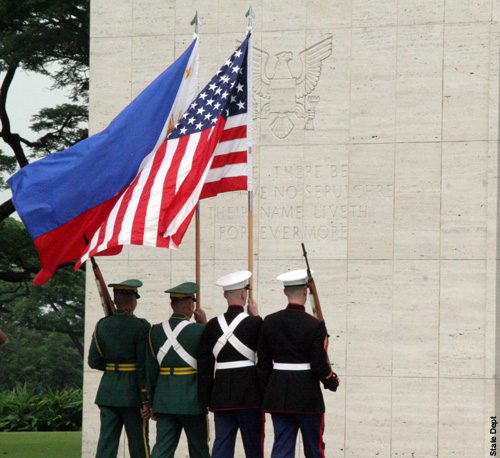 U.S. Embassy Manila
U.S. Embassy Manila
A Tested Alliance
Introduction
On May 9, 2016, Rodrigo Duterte won the Philippine presidential election, ushering in a political era that has caused alarm throughout western capitals and Southeast Asia in recent months. Since his ascent to the presidency, Duterte has geared the Philippines toward a more nationalistic approach to foreign and domestic issues. He is well known for condoning extrajudicial killings of drug addicts and criminals during his tenure as mayor in Davao City, and has continued to do so as president. Furthermore, he has directly soured the pivotal alliance between the U.S. and the Philippines, by calling President Obama a variety of expletives and implying that the joint military exercises, which ended in October 2016 will be the last between the Filipino armed forces and their American counterparts.
Duterte’s unpredictable temperament and his willingness to fracture the alliance with the U.S. has further exacerbated the territorial disputes in the South China Sea. China, lacking allies and international support, has sought to capitalize on the rift and establish stronger diplomatic ties with the Philippines in order to bolster its position in the region. To ensure a friendly, political and military atmosphere, what approach should the U.S. take to renew the relationship with the Filipino government and to curb Russian influence and the threat of China’s pursuit of expansive territorial claims?
Narcotic Control: A Russian Invitation?
The violent crackdown on drugs and criminals in the Philippines has claimed more than 2,300 lives since anti-narcotic operations began on June 30. Many of the individuals who have perished were killed by the Philippine National Police (PNP) or by vigilantes, who were spurred on by Duterte’s remarks to “do it yourself if you have the gun – you have my support.” His support for extrajudicial killings has received a considerable amount of backlash from Washington D.C., the United Nations, and the European Parliament. Washington went even further to show their displeasure with the egregious human rights violations by halting the sale of 26,000 assault rifles to the PNP.
Unfortunately, this failed to dissuade Duterte from continuing his violent crackdown against drug syndicates, and has recently explored the possibilities of acquiring military equipment from Russian arms manufactures if the U.S. was unwilling to do so. Whilst these recent revelations are detrimental for American foreign policy in the region, Duterte’s threat should be dismissed, due to his inconsistency with sticking to a solidified political agenda. However, Russia’s dedication to undermine American interests by circulating arms throughout contentious regions should be a cause of concern, but could be mitigated through diplomatic agreements that would benefit the U.S. and the Philippines while excluding foreign investors of malign intent.
Rekindling Diplomatic Ties
It is evident that the U.S. has significant political and socio-economic interests in the region, and the possibility of China forging a bi-lateral partnership with the Philippines would spell disaster for the U.S., especially for the Enhanced Defense Cooperation Agreement. The EDCA, which was passed under Duterte’s predecessor, allows the U.S. to rotate military equipment and personnel through Filipino installations, giving the U.S. a strategic position to contain foreign aggression in the South China Sea, namely China’s militarization of artificial islands in international waters. Considering Duterte’s bombastic and vitriolic nature, it would be wise for the current and future administration to tread carefully when being critical of his domestic policy, and to work with lower levels of the government to resolve diplomatic disputes.
If the U.S. chooses to indefinitely halt any military aid to the Philippines, the U.S. should continue and possibly bolster bi-lateral non-lethal narcotics control, anti-terrorism grants, access to medical innovations, and economic aid packages that would assist development throughout the nation. This would effectively minimalize Duterte’s grandstanding on the international platform while proving to the citizens of the Philippines that the U.S. remains deeply committed to their interests and well-being.





